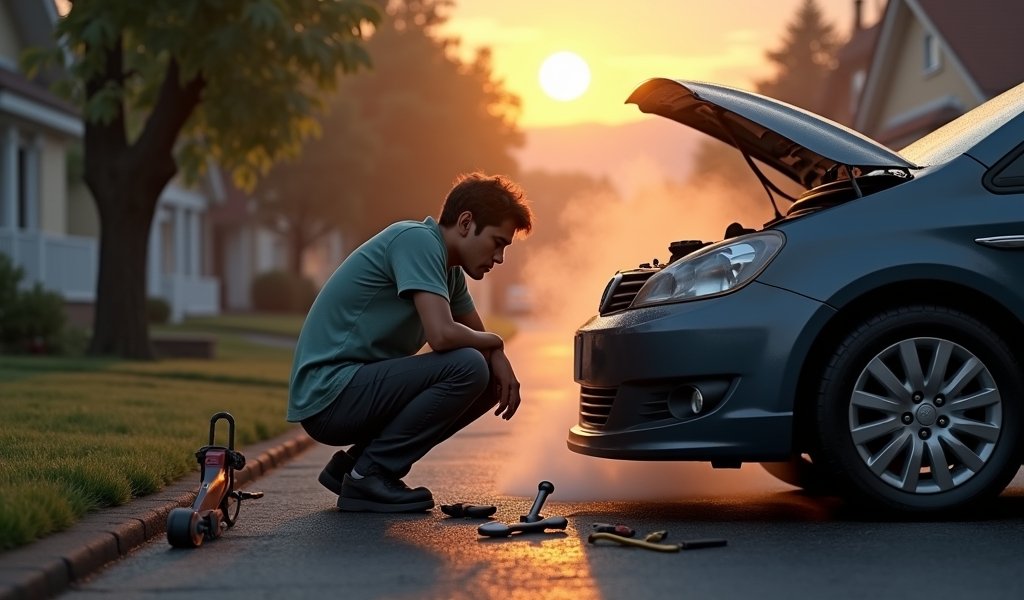Overview
This article provides five essential tips for finding a reliable auto repair shop: check for proper certifications, research reputation and reviews, consider specialization for your vehicle, understand pricing structures, and verify warranty policies. The guide emphasizes the importance of building a relationship with a quality local shop that combines technical expertise with transparent communication, rather than simply choosing the cheapest or closest option.
Table of Contents
- Finding the Best Auto Repair Shop Near You: A Practical Guide
- Why Finding a Local Auto Repair Shop Matters
- Tip #1: Look for Proper Credentials and Certifications
- Tip #2: Investigate Their Reputation and Reviews
- Tip #3: Consider Specialization and Expertise
- Tip #4: Understand Their Pricing Structure
- Tip #5: Check Warranty and Guarantee Policies
- Red Flags to Watch Out For
- Questions to Ask Before Committing
- Conclusion: Making Your Final Decision
- Frequently Asked Questions
Finding the Best Auto Repair Shop Near You: A Practical Guide
Searching for the “best auto repair shop near me” might seem straightforward, but finding a truly reliable mechanic requires more than just a quick Google search. As someone who’s spent over 20 years under the hood, I can tell you that the difference between a decent shop and a great one can save you thousands of dollars and countless headaches over the life of your vehicle.
Today’s cars are essentially computers on wheels, and not all repair shops have kept pace with modern automotive technology. That’s why finding the best auto repair shop near you involves understanding what separates the professionals from the parts-swappers.
In this comprehensive guide, I’ll share five professional tips to help you identify a trustworthy repair shop in your area. These aren’t just theoretical suggestions—they’re proven strategies I’ve recommended to friends and family for years with excellent results.
Why Finding a Local Auto Repair Shop Matters
Before diving into our tips, let’s talk about why “near me” matters in your search for auto repair. A quality local shop offers several advantages that national chains often can’t match:
- Convenience for drop-offs and pickups
- Better understanding of local driving conditions
- Potential for building a long-term relationship
- Faster response times for emergencies
- Supporting your local economy
When you find a great local mechanic, you gain more than just a service provider—you gain a partner in your vehicle’s maintenance. The best shops will remember your vehicle’s history, anticipate potential issues, and often provide more personalized service than you’d receive at a large chain.
The ideal car repair shop in your area should be close enough for convenience but good enough that you’d drive a little farther if necessary. Quality should ultimately outweigh proximity.

Tip #1: Look for Proper Credentials and Certifications
When searching for the best auto repair shop near me, certifications are your first clue about a shop’s commitment to quality. A professional shop should proudly display their credentials—they worked hard to earn them!
The gold standard in the industry is ASE certification (Automotive Service Excellence). ASE-certified technicians have passed rigorous tests in specific automotive repair areas. A shop with ASE Master Technicians has demonstrated expertise across multiple automotive systems.
Beyond ASE, look for these important credentials:
- Manufacturer-specific certifications (especially important for newer or luxury vehicles)
- AAA Approved Auto Repair facility status
- Better Business Bureau accreditation
- State-specific licenses and certifications
- I-CAR certification for collision repair
According to the Automotive Service Excellence organization, only about two-thirds of technicians who take their certification tests pass. This means ASE-certified shops represent the upper tier of automotive knowledge.
Don’t be shy about asking about specific certifications relevant to your vehicle. A shop that specializes in domestic vehicles may not be the best choice for your imported luxury car. Finding a certified car mechanic near you with expertise in your specific make can prevent costly mistakes.
Tip #2: Investigate Their Reputation and Reviews
In the age of online reviews, you have unprecedented access to other customers’ experiences. When evaluating the best auto repair shop near me, look beyond the star rating to understand patterns in customer feedback.
Start by checking these review sources:
- Google Business reviews
- Yelp
- Facebook recommendations
- NextDoor neighborhood recommendations
- Angie’s List/HomeAdvisor
- Mechanic Files on Consumer Reports
Pay special attention to how the shop responds to negative reviews. A professional shop will address complaints respectfully and offer solutions, not excuses. Even the best shops occasionally have unhappy customers—what matters is how they handle those situations.
Don’t just rely on online reviews. Ask friends, family, and coworkers about their experiences. Personal recommendations often lead to the best finds, especially from people who’ve had complex repairs done.
If possible, visit the shop before bringing your vehicle in for service. A clean, organized facility typically indicates attention to detail that extends to their repair work. The front desk staff’s treatment of you during this initial visit can also tell you a lot about the shop’s customer service philosophy.
Tip #3: Consider Specialization and Expertise
When searching for the “best auto repair shop near me,” consider what your vehicle actually needs. While general repair shops can handle many common issues, specialized expertise becomes increasingly important for complex problems or specific vehicle makes.
Types of automotive specializations include:
- Make-specific expertise (Japanese, European, American, etc.)
- Electrical and computer diagnostics
- Engine rebuilding
- Transmission specialists
- Performance tuning
- Hybrid/Electric vehicle specialists
- Diesel specialists
For routine maintenance like oil changes, tire rotations, and brake pad replacements, most reputable shops will serve you well. But for more complex issues—especially on newer vehicles with advanced electronics—specialization matters tremendously.
Ask potential shops about their experience with your specific vehicle make, model, and issue. Good mechanics aren’t afraid to admit when something falls outside their expertise. In fact, a shop that’s willing to refer you elsewhere for specialized work often demonstrates integrity that makes them worthy of your trust for other repairs.
For example, a shop that primarily works on domestic trucks might not be the best choice for your German luxury sedan’s electrical issues. Finding a specialist might cost more initially but save money in the long run by getting the diagnosis and repair right the first time.

Tip #4: Understand Their Pricing Structure
Price shopping for auto repairs can be misleading. When looking for the best auto repair shop near me, understanding how pricing works will help you make better decisions. The cheapest option rarely provides the best value in automotive repair.
Transparent shops will break down costs into parts and labor, explaining their labor rate and time estimates. Most quality shops use industry-standard labor guides like Mitchell or AllData to determine how long repairs should take.
Red flags in pricing include:
- Unusually low estimates (often leading to “surprise” additional charges)
- Reluctance to provide written estimates
- Vague descriptions of work to be performed
- Pressure to authorize repairs immediately
The best shops provide detailed written estimates and call for authorization before exceeding the estimate by a specified amount (often $50-100). This policy shows respect for your budget and demonstrates ethical business practices.
Ask about their diagnostic fees as well. Most quality shops charge for diagnostic time, but many will apply this fee toward repairs if you have the work done with them. Finding affordable auto service doesn’t mean choosing the cheapest option—it means finding the best value for quality work.
According to AAA’s automotive research, drivers who develop a relationship with a trusted repair shop tend to save money over time through proper preventative maintenance and accurate first-time repairs.
Tip #5: Check Warranty and Guarantee Policies
A shop confident in their work stands behind it with solid warranty coverage. When searching for the best auto repair shop near me, warranty policies reveal much about a shop’s confidence in their work quality.
Industry-standard warranties typically include:
- 12 months/12,000 miles on most repairs
- 24 months/24,000 miles on major repairs (engine/transmission)
- Limited lifetime warranties on some parts (like brake pads or mufflers)
Ask about nationwide warranty coverage if you travel frequently. Some shops belong to warranty networks that honor their guarantees at participating locations nationwide—an invaluable benefit for road warriors and travelers.
The warranty should cover both parts and labor, and be provided in writing. Be sure to understand any maintenance requirements that might affect warranty coverage. For instance, transmission warranties often require fluid checks at specific intervals.
Also inquire about their policy for addressing issues that arise after repairs. The best shops take ownership of problems even when the solution isn’t entirely clear, working with you until your vehicle is running properly rather than placing the burden of proof on you as the customer.
Red Flags to Watch Out For
While searching for the “best auto repair shop near me,” being able to spot warning signs can save you from a negative experience. Trust your instincts when interacting with a repair shop—if something feels off, it probably is.
Watch for these concerning signs:
- High-pressure sales tactics for additional services
- Reluctance to show you failed parts
- Drastically different diagnoses from other shops
- Unwillingness to explain repairs in understandable terms
- Disorganized or notably dirty work areas
- Frequent staff turnover (often indicates management problems)
- No vehicles in the shop (may indicate customer retention issues)
Be particularly cautious of shops that attempt to generate fear about safety to sell services. While safety concerns are legitimate, ethical shops explain these issues factually without emotional manipulation.
Another red flag is the shop that never seems to solve problems completely. Multiple return visits for the same issue usually indicates either poor diagnostic skills or intentional “repair stretching” to generate additional revenue.
A quality repair shop focuses on building relationships rather than maximizing each transaction. They understand that honest service leads to lifetime customers who also refer friends and family.
Questions to Ask Before Committing
Armed with the five professional tips for finding the best auto repair shop near me, you’re ready to interview potential shops. The right questions can help you gauge a shop’s professionalism and fit for your needs.
Consider asking:
- “Do you specialize in my vehicle make?”
- “Can I see your technicians’ certifications?”
- “How do you handle situations when a repair doesn’t fix the problem?”
- “What type of diagnostic equipment do you use?”
- “Do you provide courtesy inspections with other services?”
- “Can I get a written estimate before authorizing work?”
- “Do you use OEM (Original Equipment Manufacturer) or aftermarket parts?”
- “What’s your warranty policy?”
Pay attention not just to the answers but to how they’re delivered. Good shops welcome questions and answer patiently, recognizing that an informed customer makes better decisions.
Ask about their communication process during repairs. The best shops provide updates at key points and consult you before performing additional work. This communication style prevents surprise bills and gives you control over your vehicle’s repairs.
Finally, trust your comfort level with the staff. You’re entrusting them not only with an expensive asset but potentially with your safety and that of your passengers. A shop that treats you with respect and patience during initial questions is likely to continue that treatment throughout your relationship.
Conclusion: Making Your Final Decision
Finding the best auto repair shop near me doesn’t happen by accident—it requires thoughtful investigation and sometimes trial and error. The five professional tips we’ve covered provide a framework for making this important decision:
- Verify proper credentials and certifications
- Research reputation through reviews and referrals
- Consider specialization relevant to your needs
- Understand pricing structures and transparency
- Check warranty and guarantee policies
Remember that building a relationship with a quality shop is an investment in your vehicle’s longevity and your peace of mind. The best mechanic isn’t necessarily the cheapest or the closest—it’s the one who combines technical expertise with clear communication and ethical business practices.
Start with smaller services to test a new shop before trusting them with major repairs. Pay attention to how they treat you during these interactions. Do they explain findings clearly? Respect your decisions? Provide honest assessments without pressure?
Finding a trustworthy repair shop takes effort, but the right partnership will save you money, time, and stress throughout your vehicle’s life. Your car represents a significant investment—it deserves care from professionals who value both their craft and your business.
Ready to find a reliable shop to care for your vehicle? We’ve helped thousands of drivers connect with trusted, certified repair facilities. Contact us today for a free, no-obligation recommendation tailored to your specific vehicle and location. Your car deserves the best care, and we’re here to help you find it—just fill out our simple form for your personalized referral within 24 hours.
Frequently Asked Questions
How much should a diagnostic fee cost at an auto repair shop?
Most reputable shops charge between $75-150 for diagnostics, depending on vehicle type and complexity. Many will apply this fee toward repair costs if you have the work performed at their facility.
Should I choose an independent shop or a dealership for repairs?
Independent shops often offer better value for out-of-warranty vehicles with comparable quality to dealerships. Dealerships may be preferable for warranty work, recalls, or specialized technology in newer vehicles.
How can I tell if a shop is overcharging me?
Request itemized estimates with parts and labor costs broken out separately. You can compare parts prices online and labor times against industry standards like Mitchell or AllData guides.
What’s the difference between OEM and aftermarket parts?
OEM parts are made by your vehicle manufacturer and match original specifications exactly, while aftermarket parts are made by third parties. Quality aftermarket parts often perform well and cost less, but vary significantly in quality.
How often should I get routine maintenance done?
Follow your vehicle’s owner’s manual maintenance schedule rather than generic recommendations. Modern vehicles often require less frequent maintenance than older models due to engineering improvements and better fluids.


Pingback: Best Auto Repair Shop Near Me: Save $100 - knowsyourcar.com